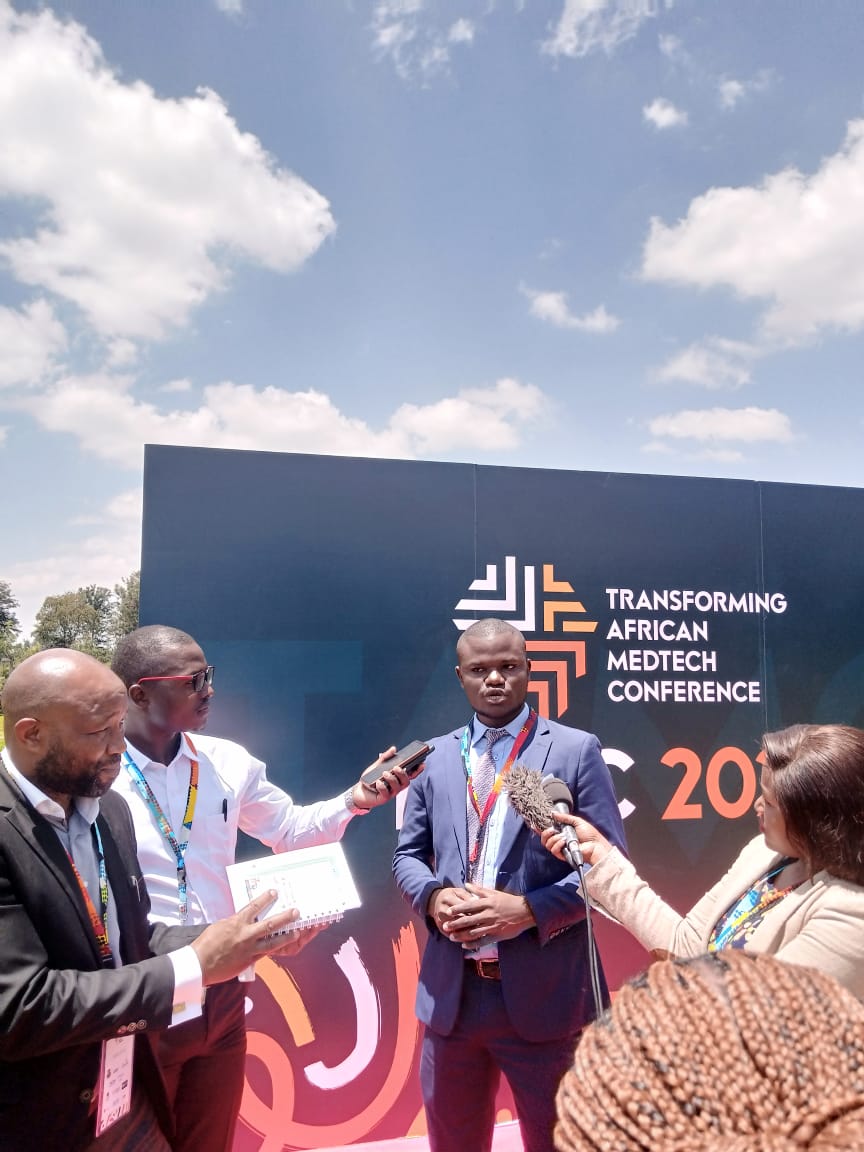Jeremiah Goodluck, founder of GONEP Pharmaceuticals
The Covid-19 pandemic laid bare glaring gaps in Africa’s healthcare systems — from vaccine access delays to shortages of essential devices.
Across the continent, patients often faced long waits, costly services, and limited access to doctors. But a new wave of innovators is stepping up with homegrown, affordable solutions designed for African realities.
These young entrepreneurs are not just building businesses; they are redefining how healthcare can be delivered on the continent.
Clinic at Hand: Healthcare beyond the hospital walls
In Kenya, Jeremiah Goodluck, founder of GONEP Pharmaceuticals, is developing Clinic at Hand, a point-of-care medical device aimed at connecting patients with doctors’ right at their doorsteps.
“The concept is to empower practitioners to provide outreach services,” Goodluck explains.
“Maybe you are at home and do not want to go to the hospital, but you still need a doctor. We are building a homegrown solution made in Kenya to solve our own challenges.”
This device, once fully rolled out, could significantly cut unnecessary hospital visits, ease congestion in health facilities, and make quality healthcare more convenient.
The AM Detector: Protecting mothers and babies
In Nigeria, where child and maternal mortality rates remain among the highest in the world, Joy Okoi and her team at Health Guardian are tackling one of the biggest killers: pregnancy complications.
Their innovation, the AM Detector, is a portable, non-invasive device that detects amniotic fluid leakage early. By alerting mothers to seek care promptly, it can prevent complications that often lead to deaths.
“We knew we needed a solution that is cost-effective, affordable, reusable, and very portable,” Okoi says.
“This device helps expectant mothers take control of their health and save lives.”
According to UNICEF, Nigeria alone accounts for about 13 per cent of global maternal deaths, underscoring the urgency of innovations like the AM Detector.
Aurora Health: Fighting the silent killer
Cardiovascular diseases are fast overtaking infectious diseases as Africa’s leading cause of death.
WHO projects that within five years, heart conditions will surpass malaria, HIV, and tuberculosis in mortality rates.
To tackle this, Dr. Alice Muhuhu founded Aurora Health Systems in 2021.
Her company is developing AI-powered medical devices that monitor heart rhythms continuously, enabling early detection and remote management.
“We’ve created a wireless electrocardiogram monitor that allows patients to be tracked in real time, even in rural facilities,” Dr. Muhuhu explains.
“This means fewer missed diagnoses and timely interventions.”
Nurturing Africa’s Health Innovators
Behind many of these breakthroughs is Villgro Africa, an incubator and impact investor that supports early-stage healthcare startups with mentorship, technical assistance, and seed funding.
“We work with innovators at the very early stage,” says co-founder Wilfred Njagi.
“Donor funding is shrinking, so Africa must build its own affordable solutions in med-tech and health-tech.”
Still, Njagi highlights a major barrier: regulation. Each country has its own approval process for medical devices, forcing innovators to repeat costly and time-consuming trials.
“We need a harmonised system so that once a device is approved in one country, it can be sold across the continent,” he urges.
Policy support and ethical oversight
Governments are beginning to take note.
At a med-tech conference in Nairobi this week, Kenya’s Director of Health Financing, Dr. Ayub Manya, acknowledged the importance of embracing innovations while ensuring ethical oversight.
“As Kenya, we must examine new technologies to see if they fit our needs,” he said.
“One challenge is that we lack enough experts to analyze the ethical implications of emerging devices. But this marketplace is important because it shows us what can be adopted.”
He urged the public to welcome new technologies that promise to transform healthcare delivery.
Why it matters
Africa accounts for 24 per cent of the global disease burden but only 3 per cent of the world’s healthcare workers.
Solutions like Clinic at Hand, the AM Detector, and AI-driven cardiac monitoring show that Africa’s innovators are not waiting for external saviors — they are designing context-specific answers to some of the continent’s toughest health challenges.
If supported with funding, favourable policies, and harmonized regulation, these innovations could bridge healthcare gaps, reduce preventable deaths, and ensure a healthier future for millions.


